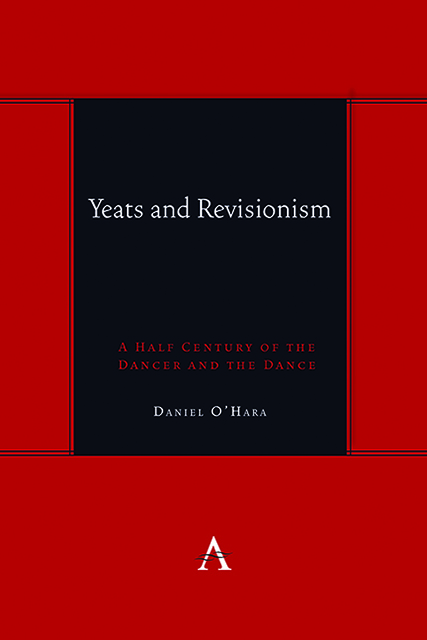Book contents
- Frontmatter
- Dedication
- Contents
- Acknowledgments
- Preface
- Introduction: Dancer and Dance: Yeats’s Romantic Modernism and Critical Revisionism
- Chapter 1 The Irony of Tradition in W.B. Yeats’s Autobiography: Dialectical Hermeneutics Beyond the New Criticism
- Chapter 2 The Specialty of Self-Victimization: On Antithetical Revisionism
- Chapter 3 Yeats in Theory: Blackmur, Bloom, De Man and Hartman
- Chapter 4 The Divisions of Yeats Studies Continued
- Chapter 5 Modernism’s Global Identity: on the Dogmatic Imagination in Yeats, Freud and Beyond
- Chapter 6 Yeats With Lacan: Toward the Real Modernism
- Chapter 7 The Spirit Medium: Yeats, Quantum Visions and Recent Lacanian Studies
- Chapter 8 And All the Ceremonies to Come: Of High Modernism, Visionary Violence and Post-Marxism
- Afterword: The Reader in Yeats
- Bibliography
- Index
Chapter 6 - Yeats With Lacan: Toward the Real Modernism
Published online by Cambridge University Press: 08 June 2023
- Frontmatter
- Dedication
- Contents
- Acknowledgments
- Preface
- Introduction: Dancer and Dance: Yeats’s Romantic Modernism and Critical Revisionism
- Chapter 1 The Irony of Tradition in W.B. Yeats’s Autobiography: Dialectical Hermeneutics Beyond the New Criticism
- Chapter 2 The Specialty of Self-Victimization: On Antithetical Revisionism
- Chapter 3 Yeats in Theory: Blackmur, Bloom, De Man and Hartman
- Chapter 4 The Divisions of Yeats Studies Continued
- Chapter 5 Modernism’s Global Identity: on the Dogmatic Imagination in Yeats, Freud and Beyond
- Chapter 6 Yeats With Lacan: Toward the Real Modernism
- Chapter 7 The Spirit Medium: Yeats, Quantum Visions and Recent Lacanian Studies
- Chapter 8 And All the Ceremonies to Come: Of High Modernism, Visionary Violence and Post-Marxism
- Afterword: The Reader in Yeats
- Bibliography
- Index
Summary
The second volume of R. F. Foster's biography, W.B. Yeats: A Life: The Arch-Poet, 1915-1939 (the first volume was the award-winning The Apprentice Mage) clearly completes a major achievement in literary biography every bit as masterful and illuminating as Richard Ellmann's life of James Joyce. Despite this obvious achievement, however, I come away from finishing my reading of it disturbed. What disturbs me is not the usual kind of complaint about literary biography, that the biographer has poured so many facts into his text the writer's work has been overwhelmed by the contexts of history and personal life.
Foster has already demonstrated brilliantly in the first volume, and he continues the demonstration here, that he can marshal all the facts and place the work in context and still do justice to its large formal structures and major themes. Although close textual analysis of a specialized kind is apparently not Foster's forte, for purposes of literary biography it is not really necessary, and in fact would just get in the way, stopping the onward dynamic thrust of the story he has to tell.
Basically, that story is how the 52-year-old W. B. Yeats (to whom Foster consistently refers as WBY, for short), on marrying the 24-year-old Georgie Hyde Lees in October 1917 finds not only an erotic and domestic partner, willing to bear him children and run his everyday life more efficiently and sympathetically than anyone else ever could. But he also finds, for the first decade of their marriage at least, an occult muse whose automatic writing, dream-visions and oracular medium-like trances give him, as the spiritual Instructors later claims, “metaphors for poetry,” not to mention the most sustained and successful sexual relationship in his life. Indeed, she gives him, as Foster shows, metaphors for the experience of poetic inspiration and visionary eroticism so powerful and original, whatever their traditional sources, that it could rightly be said that if any person (other than Yeats himself) remakes this once minor figure into the major poet to write English in the last century, it is certainly she.
But it is not, of course, Foster's magisterial rehearsal of this familiar story that disturbs me. Nor it is that Foster writes dismissively of Yeats's occult beliefs, for he does not.
- Type
- Chapter
- Information
- Yeats and RevisionismA Half Century of the Dancer and the Dance, pp. 105 - 114Publisher: Anthem PressPrint publication year: 2022

